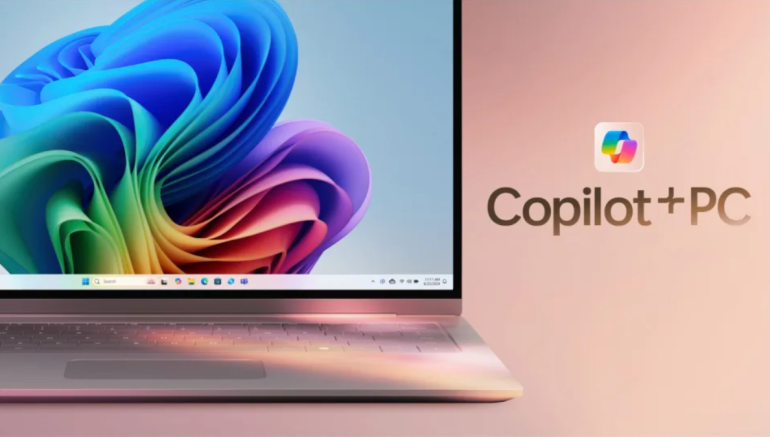- Microsoft introduces Copilot+ PCs, integrating generative AI capabilities into Windows systems.
- Collaboration with chip manufacturers like AMD, Intel, and Qualcomm ensures cutting-edge hardware.
- Copilot+ laptops available for pre-order, starting at $999, with shipping on June 18.
- Promises significant performance boost over M3-powered MacBook Airs and extended battery life.
- Windows Copilot Runtime integrates over 40 AI models, enhancing user experience and privacy.
- Features like ‘Recall,’ ‘Super Resolution,’ and ‘Live Captions’ enrich functionality and accessibility.
- Introduction of ‘Auto Super Resolution’ enhances gaming experience through AI-driven upscaling.
- Copilot app offers seamless integration with Windows and future customization options.
- Strategic alignment with Arm-based architecture broadens Windows compatibility.
- Reflects industry trend towards pervasive AI integration in computing devices.
Main AI News:
The realm of computing has been abuzz with anticipation for Microsoft’s venture into what they term “AI PCs.” During a preliminary Build event, the tech giant laid out its roadmap.
Dubbed Copilot+ PCs, Microsoft’s latest innovation represents a paradigm shift in Windows-based systems. These PCs boast dedicated hardware tailored for local processing of complex generative AI tasks, eliminating heavy reliance on cloud infrastructure. Key to this endeavor is the integration of a specialized chipset featuring a Neural Processing Unit (NPU), with industry players like Qualcomm leading the charge with offerings such as the Snapdragon X Elite.
In a strategic move, Microsoft has embraced a collaborative ethos in the development of Copilot+ PCs. Partnering with leading chip manufacturers including AMD, Intel, and Qualcomm, alongside prominent OEMs like Acer, ASUS, Dell, HP, and Lenovo, the company aims to usher in a new era of computing. The inaugural lineup of Copilot+ laptops is now open for pre-orders, slated for shipping on June 18, with prices starting at $999.
Yusuf Mehdi, Microsoft’s EVP and Consumer Chief Marketing Officer, emphasized the transformative nature of these devices, heralding them as the epitome of power and performance. However, while the claim of being the most potent PCs holds promise, real-world testing will be the ultimate judge. Mehdi also lauded the sleek and elegant design of the first-generation laptops, underscoring their remarkable portability.
Distinct from existing AI-enabled PCs, Copilot+ systems set a new performance benchmark, requiring a minimum of 40 Tera Operations Per Second (TOPs) from the NPU, coupled with 16GB RAM and 256GB storage. Qualcomm’s Snapdragon X Elite, boasting up to 75 TOPs, exemplifies this cutting-edge hardware. Yet, beyond raw specifications, Microsoft’s prowess lies in maximizing the potential of this hardware ecosystem.
Furthermore, Microsoft claims a significant performance leap over M3-powered MacBook Airs, touting Copilot+ PCs as 58 percent faster. Notably, the company’s assertion comes amidst Apple’s ongoing advancements in chip technology. Battery longevity is another highlight, with Copilot+ laptops purportedly offering up to 22 hours of video playback and 15 hours of web browsing.
Driving this innovation is the Windows Copilot Runtime, integrating over 40 AI models into the Windows 11 framework. These models, deeply ingrained within the OS, facilitate seamless interaction with hardware while bolstering privacy and security measures. Mehdi stressed the universality of these models, emphasizing their compatibility across various applications.
Among the standout features is ‘Recall,’ a refined iteration of Windows 10’s Timeline feature. Utilizing natural language cues, users can effortlessly retrieve past information, navigating through apps, documents, and messages via an intuitive timeline interface. Importantly, Microsoft underscores its commitment to responsible AI practices, assuring users of data privacy.
Additionally, Windows Photos introduces ‘Super Resolution,’ enabling users to enhance old snapshots, accompanied by an AI-driven storytelling feature. ‘Live Captions’ further enrich the user experience, offering real-time captioning and translations from over 40 languages during video playback.
In the realm of gaming, Microsoft introduces ‘Auto Super Resolution,’ akin to NVIDIA’s DLSS, promising enhanced graphics resolution and refresh rates through AI-driven upscaling, all without compromising performance.
Complementing these features is the Copilot app, providing a versatile interface for seamless integration with Windows functionalities. With dedicated Copilot keys on compatible keyboards, users can access the app effortlessly, with future iterations expected to offer enhanced Windows customization options.
Microsoft’s strategic alignment with Arm-based architecture signals a concerted effort to broaden Windows compatibility. Bolstered by the Prism emulator, Microsoft endeavors to ensure seamless transition for users, enabling legacy x86/x64 apps to run natively on Arm-based Windows.
The Copilot+ PC represents a culmination of trends observed in flagship mobile devices, notably in the Android sphere, where on-device AI processing has become commonplace. Looking ahead, Apple’s imminent foray into generative AI, spearheaded by the M4 chip, underscores the industry’s trajectory towards pervasive AI integration.
Conclusion:
Microsoft’s unveiling of Copilot+ PCs signifies a major leap in AI-embedded computing, with implications for the market. By integrating advanced generative AI capabilities into Windows systems and fostering collaboration with industry leaders, Microsoft is poised to redefine the landscape of computing. The introduction of Copilot+ PCs not only enhances performance and functionality but also underscores the growing importance of AI integration in consumer electronics. As competitors strive to keep pace, we anticipate a surge in innovation and competition within the AI-enabled computing market.

